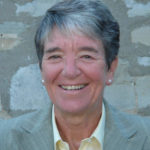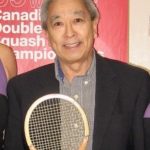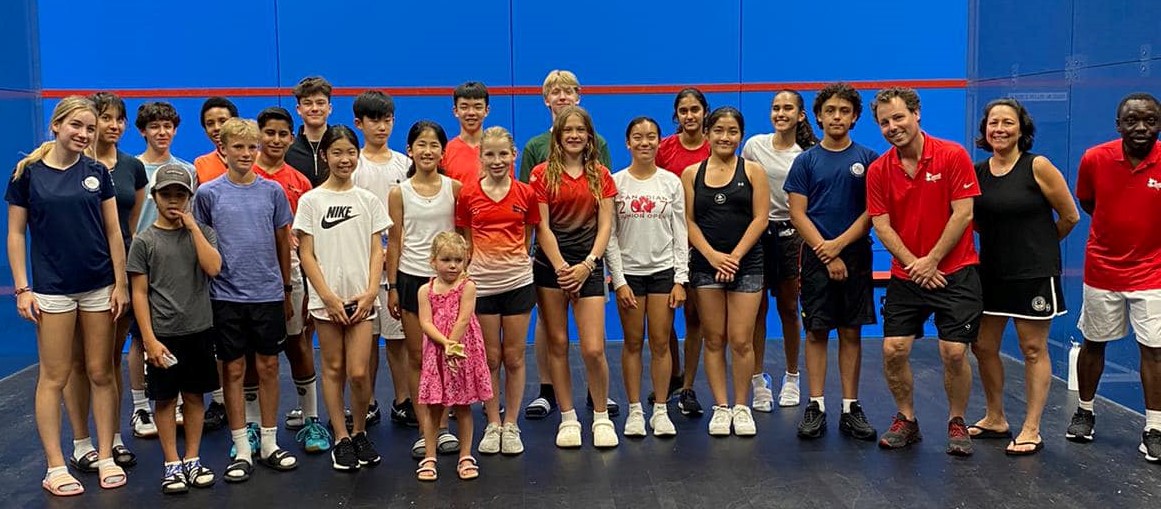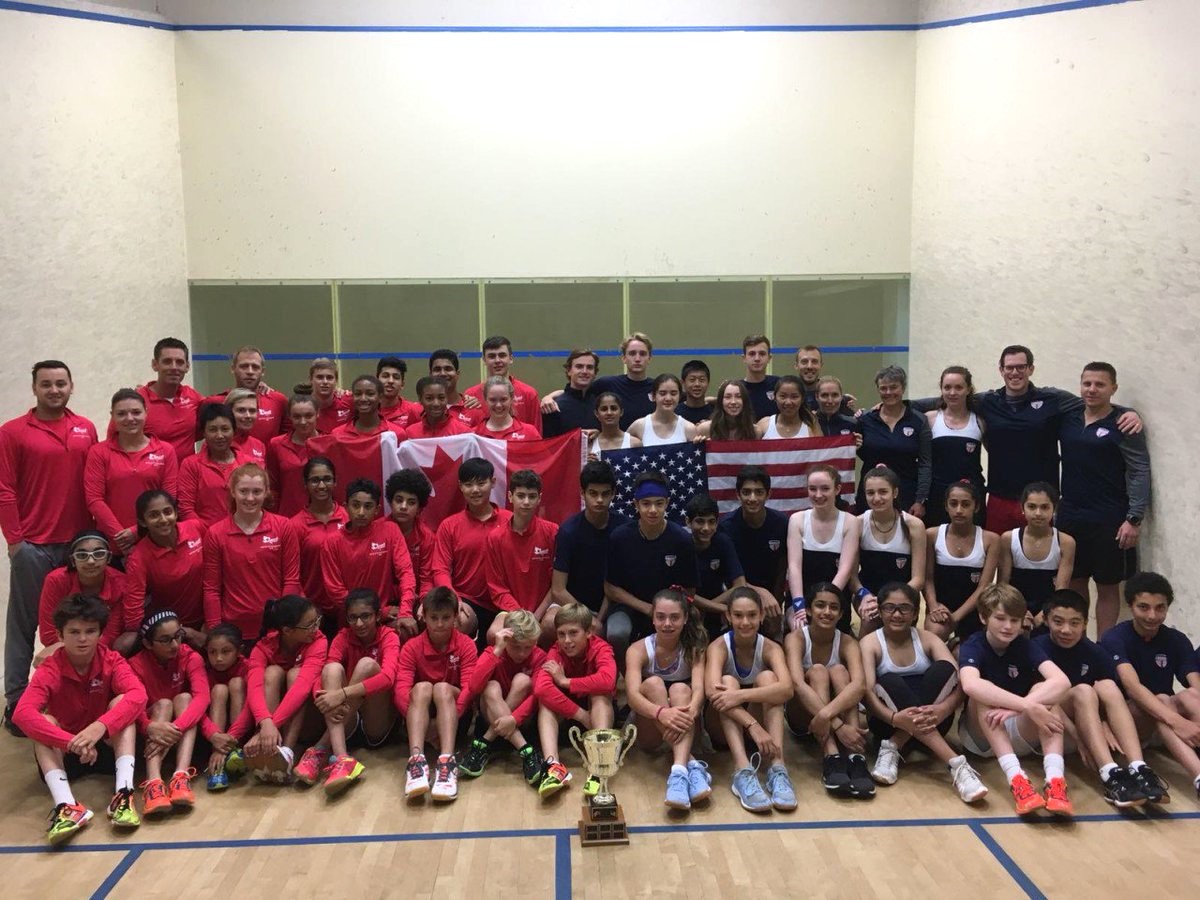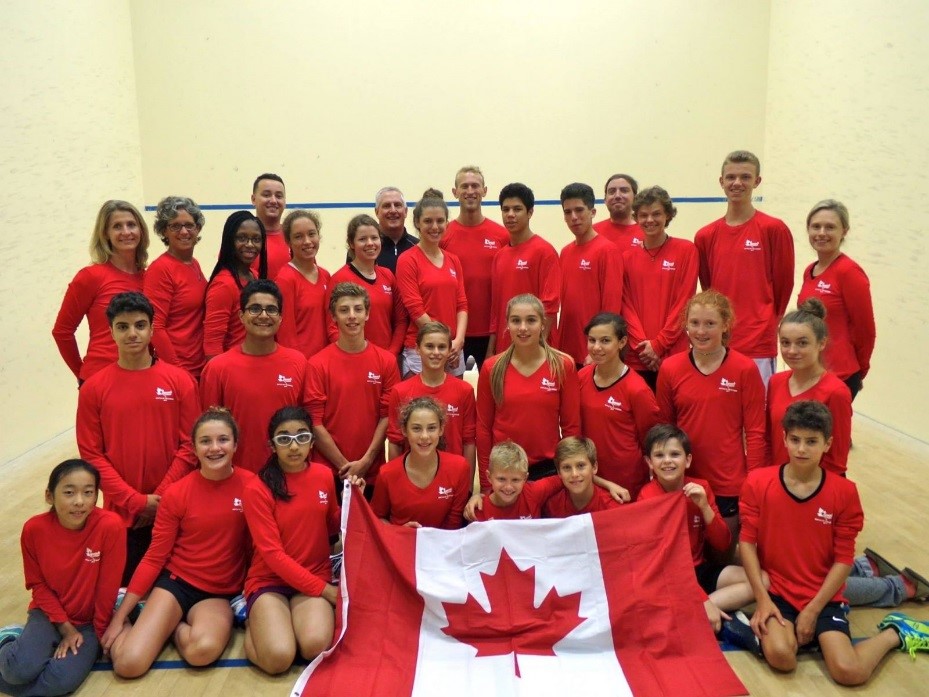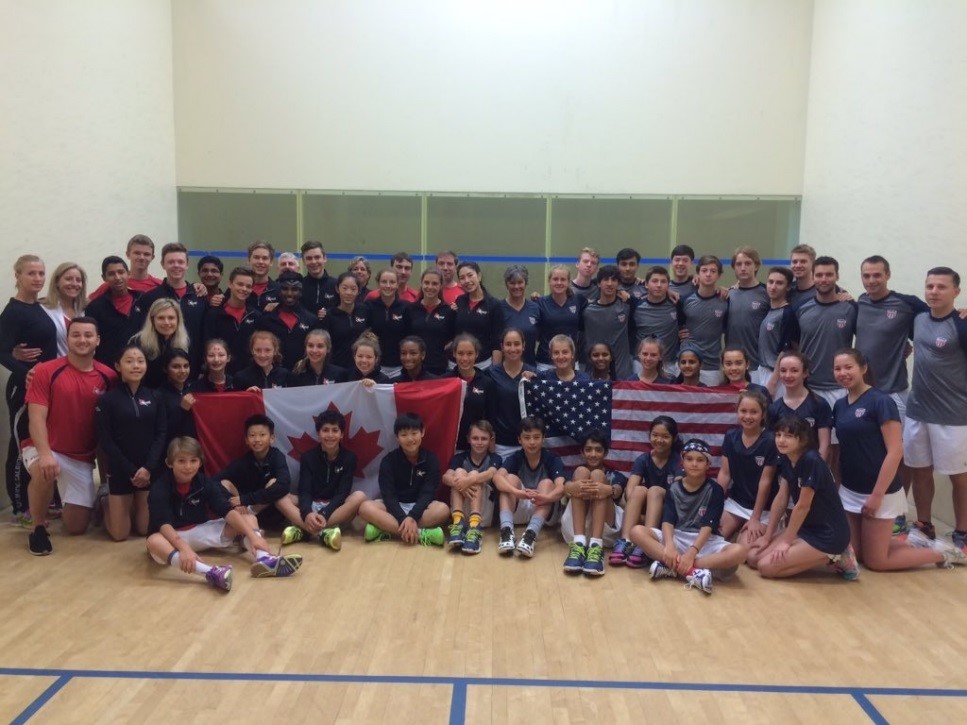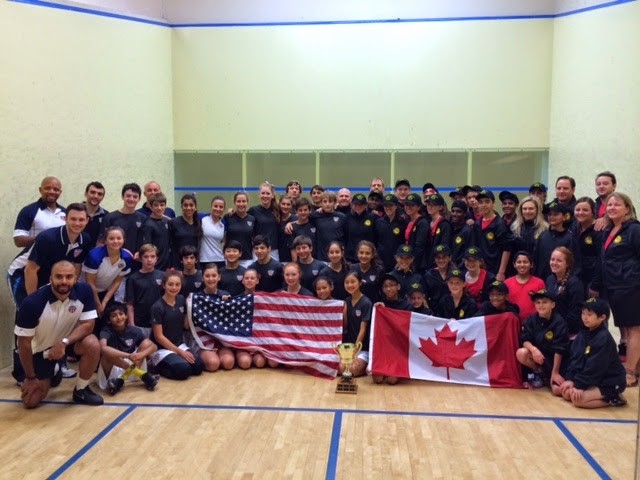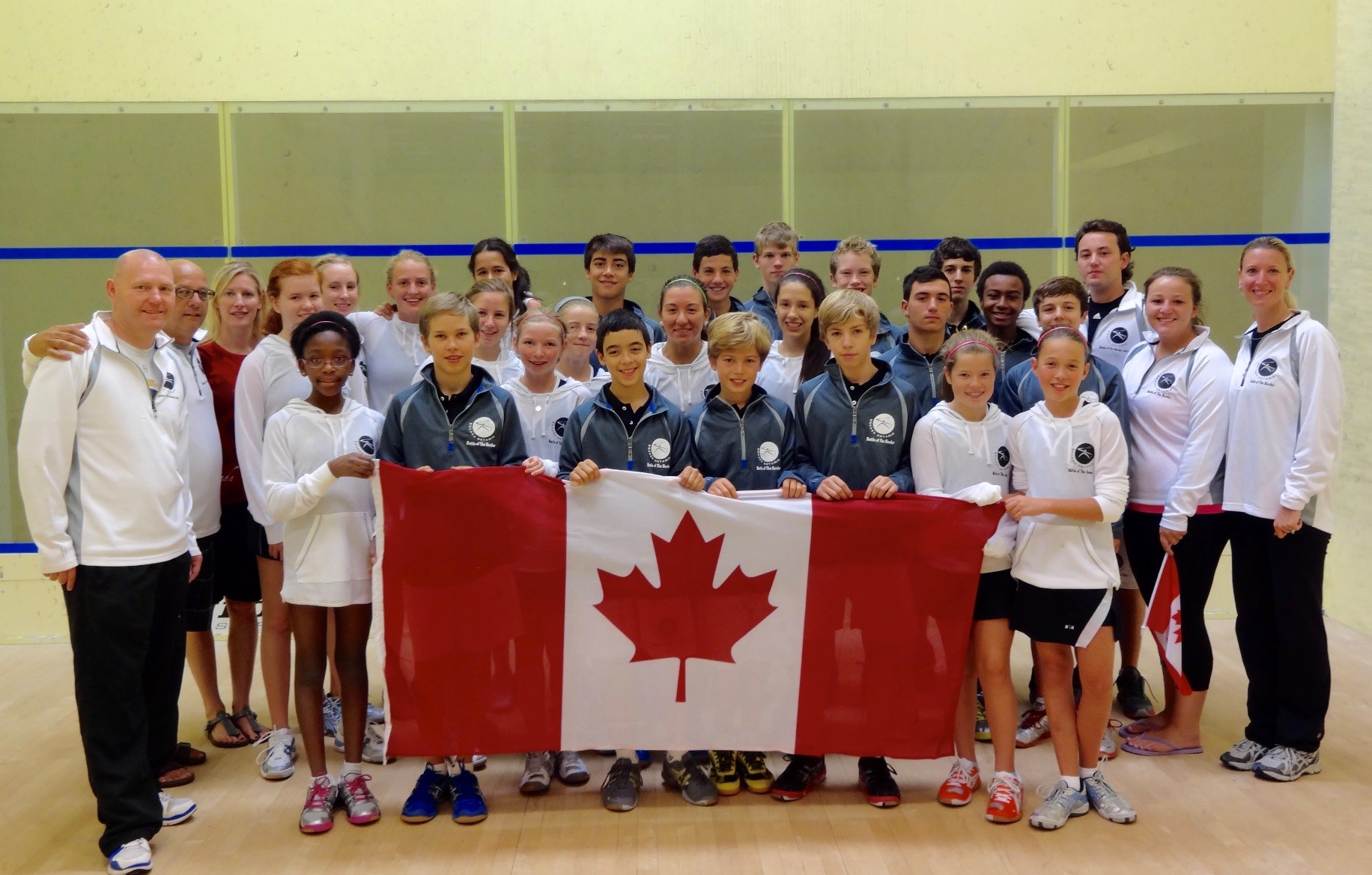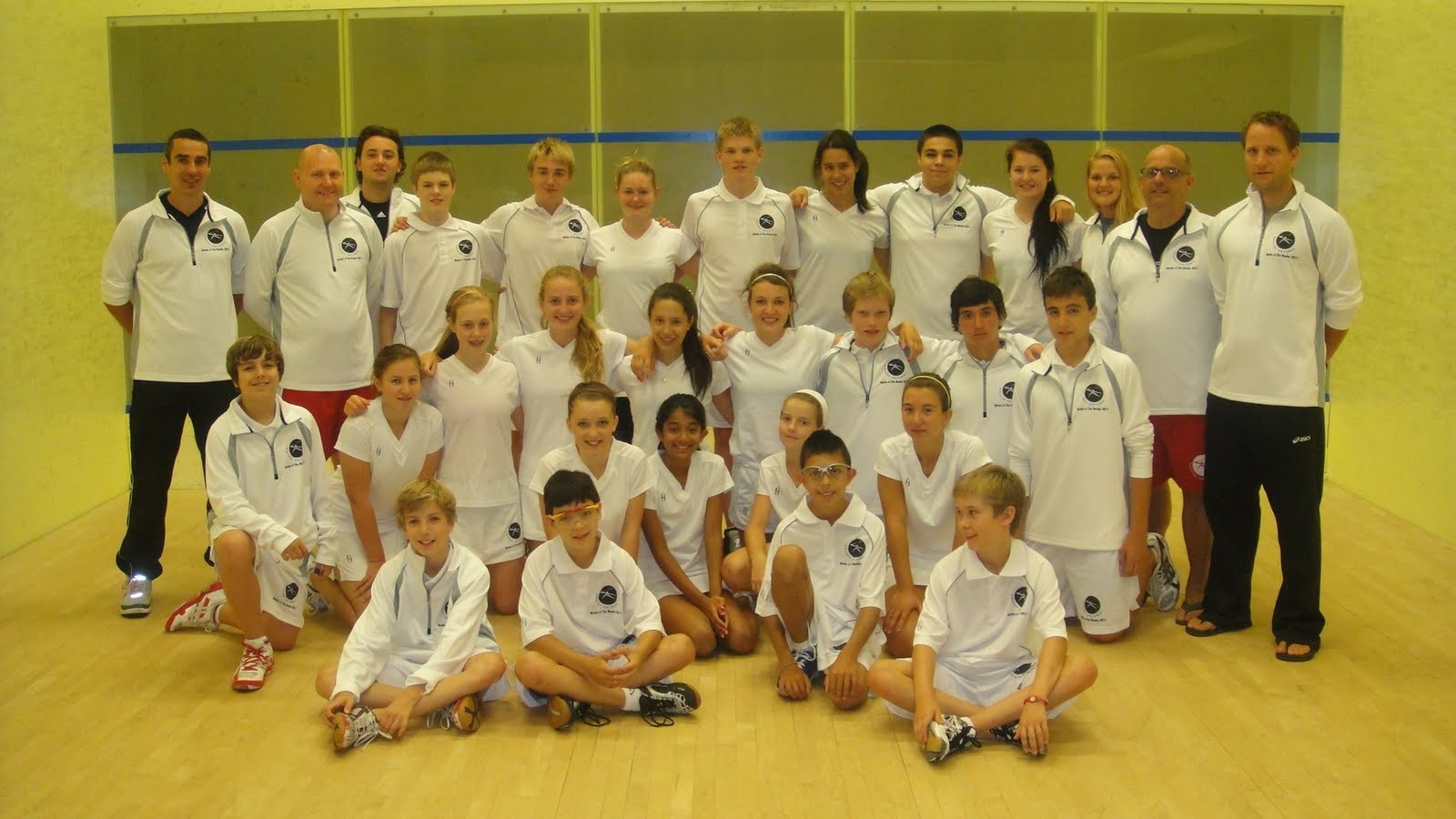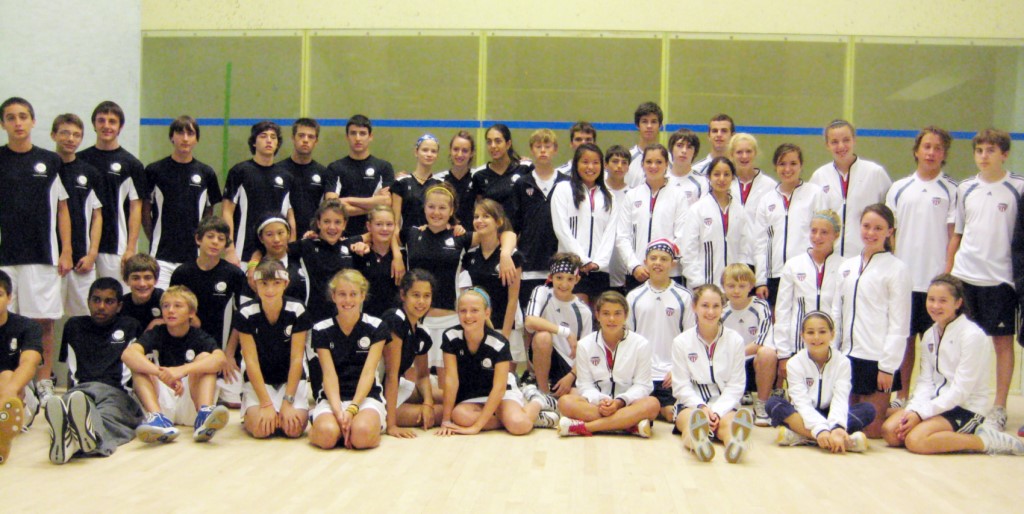The game of Squash was invented around 1830 at Harrow School in England as an offshoot of the game of Rackets. Students discovered that the game, played on a smaller court with a slower and less lethal rubber ball, which “squashed” on impact against a wall, produced a wide variety of shots, required quick footwork, and was very enjoyable to play. The first four squash courts were not constructed at the school until about 1864, when squash was unofficially founded as a sport.
The game was introduced to North America in the 1880s. One of Vancouver’s pioneer players, Bimbo Sweeney, learned to play the game in 1899 on a court built to English standards by the Honourable Cecil Edwards at his Vancouver residence. A court was built at the St. John’s Tennis Club in Newfoundland in 1904, thanks to Sir Leonard Outerbridge, who had the proper dimensions sent from Marlborough College in England where he was studying. Other courts followed in Toronto (1905), Winnipeg (1909), Montreal (1911), Hamilton (1912), Ottawa (1915), and later in other locations across Canada.
The first Canadian Men’s Singles Championship was held at the Montreal Racket Club on March 20, 1912, but the Canadian Squash Racquets Association was not formed until 1915. The five founding members were the Montreal Racket Club, Toronto Racquet Club, Hamilton Squash Racquets Club, University Club of Toronto, and the Ottawa Squash Racquets Club, each of which paid an annual fee of $20. The Montreal Racket Club deeded the “Singles Squash Rackets Championship of Canada Challenge Cup” to the Canadian Squash Racquets Association in 1915.
Kenneth Molson of Montreal was the first Canadian champion in 1912, and Charles Peabody of Boston, the first foreign player to win the title, in 1921. An international team competition for Men’s Singles (the Lapham Cup) was initiated between Canada and the U.S.A. the next year in 1922, and other similar international team matches have followed since.
The English softball singles game prevailed in Canada until after the First World War, but Canada then switched to the hardball game being played in the U.S.A., and continued to hold national and provincial hardball championships until the early 1990s. However, in the early 1970s, Canada also adopted the English (by then international) softball game again, with the first national softball champion being crowned in 1974. At that time there was a surge in the construction of singles softball courts right across Canada. Canadians currently participate with the international ball in major competitions all around the world. One World champion and several world class players are proof of this success.
Although hardball singles has, in general, been phased out, the doubles hardball game continues to prosper in North America and is slowly expanding around the world, with courts known to exist in Barbados, Malaysia, Mexico, Scotland, Singapore and Thailand.
In accordance to its Bylaws, Article 5.5, Squash Canada may recognize individuals who have, in the opinion of the Board, provided valuable service to the Corporation. The following individuals have been recognized as Honourary Officers:
- 2010 – Joe Hattori, Kelowna, BC
- 2004 – Jim McAuliffe, Thunder Bay, ON
- 1998 – Anne Smith, London, ON
The Lapham Cup matches between Canada and the U.S.A., dating back to 1922, are believed to be one of the oldest amateur sporting events between two countries, having been played for 90 consecutive years. The Grant Trophy matches were inaugurated in 1945, the Crawford Trophy matches in 1999, and the Lawrence-Wilkins Trophy matches in 2001. These four events, held at the same time and venue, are hosted in alternate years by Canada and the United States. Starting in 2000, all singles matches have been played with the international ball.
It is a tradition that the captains cooperate to make sure that their teams are balanced, and that matches are played in an atmosphere of camaraderie, goodwill, and sportsmanship. Matches are not refereed, therefore the highest standards of fair play are essential among participants. The matches also provide an opportunity for representatives from both sides of the border to discuss squash development initiatives. This grand social event has many unique traditions, including the Friday evening Captains’ reception, roses for every lady attending the Saturday night banquet, a LG tie (or scarf) for every player participating in the event for the first time, and the Eric R. Finkelman Award for “questionable behaviour”.
The coveted Lapham Cup is valued at over $50,000 and is similar in size to hockey’s Stanley Cup. It was donated in 1922 by Henry B. Lapham of Brookline, Massachusetts, for an international Men’s singles team competition between the U.S.A. and Canada. The Grant Trophy was donated in late 1944 by Alastair Grant of Montreal for a similar Men’s doubles competition. The Crawford Trophy was donated in 1999 by William Crawford of Vancouver in honour of his wife Richenda, for Ladies singles and doubles team competition. In 2001, Edgar A. Bracht of Toronto presented the Lawrence-Wilkins Trophy for the Men’s “Legends” (aged over 65) doubles team competition. It is named in honour of the truly legendary figures of Barney Lawrence of Kitchener-Waterloo, Ontario and C. Howard Wilkins Sr of Wichita, Kansas, both of whom did so much for the game, as players and builders.
- Toronto Cricket Club’s Jay Gillespie holds the longest run in the history of Canadian Doubles titles with a total of eight consecutive doubles titles (2007-2014 in Canadian Mixed 50+ and & 55+ Doubles Championships – winning seven with Lolly Gillen & one with Leslie Freeman).
- Only one woman and two men have ever won five consecutive Canadian Doubles titles in the same age category. Only one man has won five consecutive doubles titles both in Canadian Mixed and Men’s Doubles Championships.
- 2009-2013 Stephanie Hewitt – Mixed Open
- 2004-2008 Scott Dulmage – Mixed Open
- 2010-2016 Scott Dulmage – Men’s 40+
- 2014-2018 Sean McDonough – Men’s 60+ (all with Sandy Tierney, USA)
- There are only 11 Canadian players that have won four consecutive doubles titles in the same age category:
- Men’s Open
- 1960-1963 Lorne Main & S Pemberton-Smith
- 2014-2017 Robin Clarke & Scott Arnold
- Men’s 40+
- 1954-1958 Harald R. Martin & Leonard Schlemm
- Men’s 50+
- 1975-1978 Gord Guyana
- 1995-1998 Tom Poor
- Women’s 40+
- 1998-2001 Lolly Gillen
- 2014-2017 Michele Ramsey
- Mixed Open
- 1982-1985 Barb Savage
- 2005-2008 Jessica DiMauro
- Mixed 50+
- 2007-2010 Jay Gillespie
- Mixed 55+
- 2007-2010 Lolly Gillen & Jay Gillespie
- Men’s Open
Note: David Potter & Chris Wheeler will be going for their 4th title in 2019
Most Men’s Open – Jamie Bentley (6), Paul Deratnay (4), Taylor Fawcett (4) & Scott Stoneburgh (4)
Most Women’s Open – Jessica DiMauro (9), Karen Jerome (8), Stephanie Hewitt (7)
 Canadian and American doubles teams compete every second year for the Can-Am Cup. It brings together the best men’s and women’s doubles squash players from across North America in a “Ryder Cup” team format with open and age group categories. The inaugural event was held in Boston, Massachusetts in 2008 and rotates between countries.
Canadian and American doubles teams compete every second year for the Can-Am Cup. It brings together the best men’s and women’s doubles squash players from across North America in a “Ryder Cup” team format with open and age group categories. The inaugural event was held in Boston, Massachusetts in 2008 and rotates between countries.
Hosts of this prestigious event include Boston, Massachusetts in 2008, Toronto, Ontario (2010), Buffalo, New York (2012), Montreal, Quebec (2014), Wilmington, Delaware (2016), Toronto, Ontario (2018) and Baltimore, Maryland (2020).
Can-Am Cup Selection Criteria 2020 – Click Here
For more information on the Can-Am Cup – Click Here
The Alex Doucas Memorial Award is presented to the competitor in the Canadian Junior Squash Championships who best exemplifies the spirit of fair play, enjoyment of life and commitment to excellence, as exhibited by Alex Doucas during his lifetime. In particular:
- Fair Play – includes having respect for the rules of the game and having respect for referees and opponents.
- Enjoyment of life – includes actions off the court that demonstrate openness, honesty, friendliness, and support for fellow competitors.
- Commitment to excellence – includes a willingness to sacrifice, exhibiting a high degree of discipline and dedication, in order to achieve the highest possible standard of play.
Candidates will be restricted to one of the top 8 finishers in the Women’s or Men’s U19 category. Junior coaches and officials will be polled during the Championships for their recommendation.
Past Recipients:
- 2023 – Iman Shaheen
- 2022 – Alexandra Bown
- 2021 – Event Cancelled
- 2020 – Event Cancelled
- 2019 – James Flynn
- 2018 – Elliott Hunt
- 2017 – Emma Jinks & Ryan Picken
- 2016 – Matthew David Toth
- 2015 – Matthew Henderson
- 2014 – Alison Richmond
- 2013 – Jarryd Osborne
- 2012 – Tyler Lee
- 2011 – Nicole Bunyan & Tyler Osborne
- 2010 – Andrew Schnell
- 2009 – Samantha Cornett
- 2008 – Nikole Todd
- 2007 – David Letourneau
- 2006 – Andrew McDougall
- 2005 – Andrew Boumford & Ashley Malenchak
- 2004 – Robin Clarke
- 2003 – Kyla Grigg
- 2002 – Greg Hunter
- 2001 – Mike Blumberg
- 2000 – Andrew Jones & David Yik
- 1999 – Dan Rutherford
- 1998 – Carl Baglio
- 1997 – Alana Miller
- 1996 – Peter Yik
- 1995 – Sally Norgate
- 1994 – Jan Wilson
- 1993 – Rob Wilson
- 1992 – Ben Thomas
- 1991 – Melanie Jans
- 1990 – Patrick Ryding
The “Battle of the Border” was initially founded in a Team Ontario vs Team USA format in 2004, by US-based Bryan Patterson and the late Mark Sachvie of Ontario, with groups of 4 players in each of the GU13, GU15, BU13, and BU15 sections. The GU17 and BU17 sections were added in 2005. For many players, the Battle of the Border has been their first introduction to representative international competition. The matches have always been played at The Club at White Oaks in Niagara-on-the-Lake, Ontario (near St. Catharines and Niagara Falls).
In 2015, Squash Canada took over responsibility for running the event, changing Team Ontario to Team Canada, and incorporating the Battle of the Border into the Canadian junior athlete pathway. This involved using the event as an opportunity to create development and training opportunities for Canada’s rising talents. Each year the Athletic Development Program junior camps are held before and after the event.
For full annual event results – Click Here
- Men’s World Team Championships
- Women’s World Team Championships
- Junior Men’s World Team Championships
- Junior Men’s World Individual Championships
- Junior Women’s World Team Championships
- Junior Women’s World Individual Championships
- Pan American Games
- Pan American Championships
- Pan American Junior Championships
